Factors to Consider When Investing in a Foreign Country
VerifiedAdded on 2023/06/12
|6
|1561
|404
AI Summary
This paper explores the challenges of investing in a foreign country that presents based on cultural differences, social diversity, different economic systems, and divergent management. It provides a succinct overview on what managers should consider before undertaking international joint ventures.
Contribute Materials
Your contribution can guide someone’s learning journey. Share your
documents today.
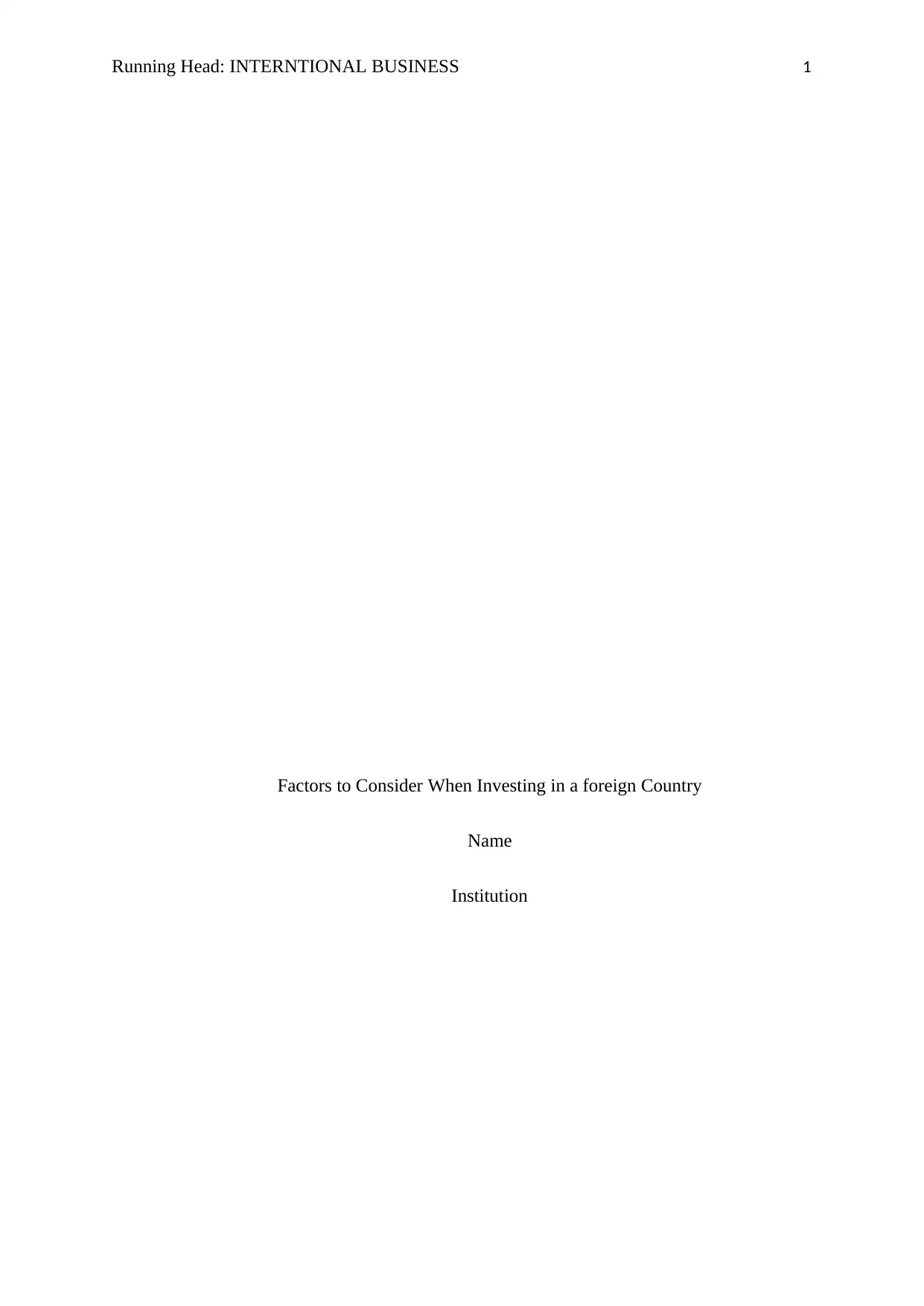
Running Head: INTERNTIONAL BUSINESS 1
Factors to Consider When Investing in a foreign Country
Name
Institution
Factors to Consider When Investing in a foreign Country
Name
Institution
Secure Best Marks with AI Grader
Need help grading? Try our AI Grader for instant feedback on your assignments.
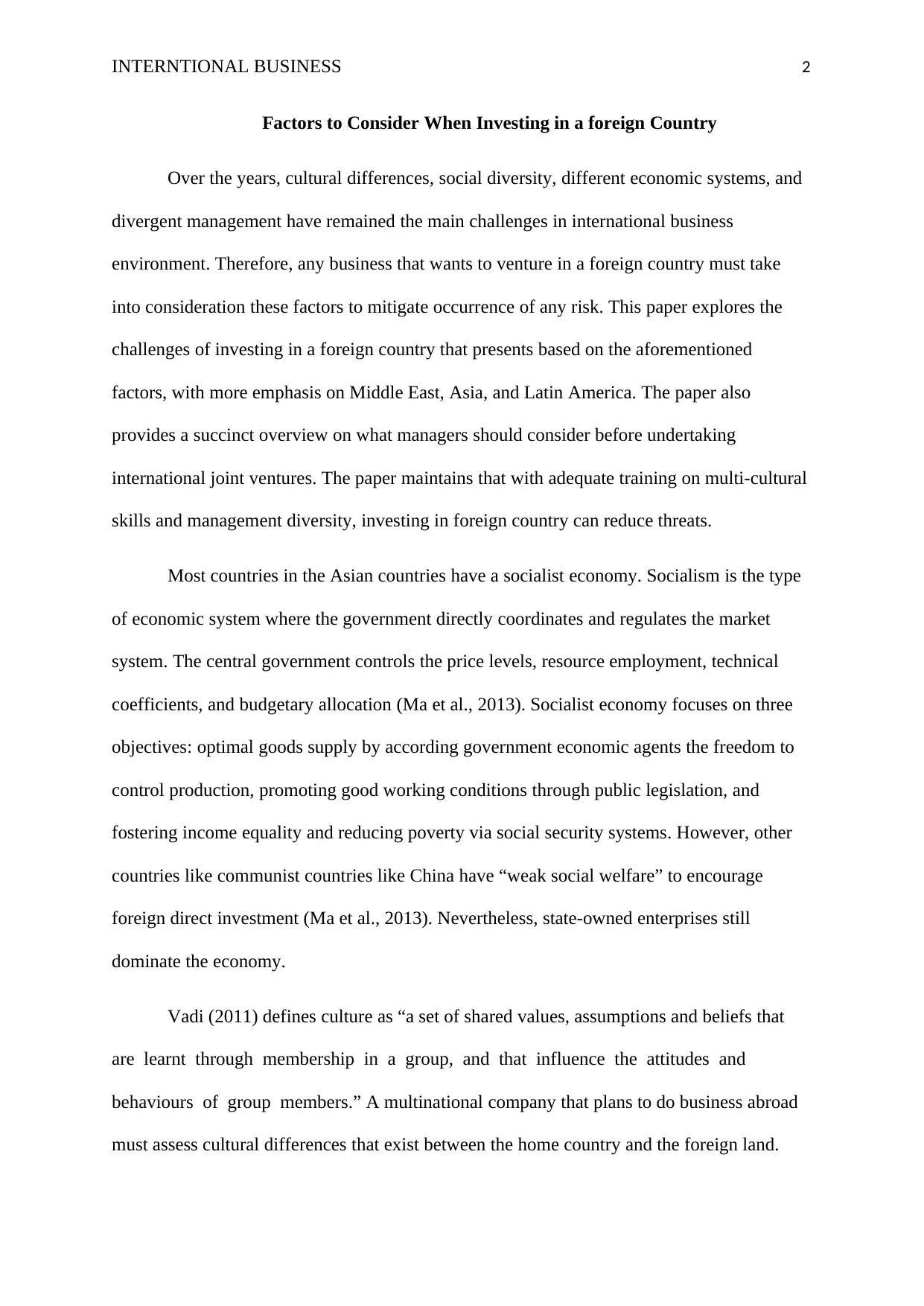
INTERNTIONAL BUSINESS 2
Factors to Consider When Investing in a foreign Country
Over the years, cultural differences, social diversity, different economic systems, and
divergent management have remained the main challenges in international business
environment. Therefore, any business that wants to venture in a foreign country must take
into consideration these factors to mitigate occurrence of any risk. This paper explores the
challenges of investing in a foreign country that presents based on the aforementioned
factors, with more emphasis on Middle East, Asia, and Latin America. The paper also
provides a succinct overview on what managers should consider before undertaking
international joint ventures. The paper maintains that with adequate training on multi-cultural
skills and management diversity, investing in foreign country can reduce threats.
Most countries in the Asian countries have a socialist economy. Socialism is the type
of economic system where the government directly coordinates and regulates the market
system. The central government controls the price levels, resource employment, technical
coefficients, and budgetary allocation (Ma et al., 2013). Socialist economy focuses on three
objectives: optimal goods supply by according government economic agents the freedom to
control production, promoting good working conditions through public legislation, and
fostering income equality and reducing poverty via social security systems. However, other
countries like communist countries like China have “weak social welfare” to encourage
foreign direct investment (Ma et al., 2013). Nevertheless, state-owned enterprises still
dominate the economy.
Vadi (2011) defines culture as “a set of shared values, assumptions and beliefs that
are learnt through membership in a group, and that influence the attitudes and
behaviours of group members.” A multinational company that plans to do business abroad
must assess cultural differences that exist between the home country and the foreign land.
Factors to Consider When Investing in a foreign Country
Over the years, cultural differences, social diversity, different economic systems, and
divergent management have remained the main challenges in international business
environment. Therefore, any business that wants to venture in a foreign country must take
into consideration these factors to mitigate occurrence of any risk. This paper explores the
challenges of investing in a foreign country that presents based on the aforementioned
factors, with more emphasis on Middle East, Asia, and Latin America. The paper also
provides a succinct overview on what managers should consider before undertaking
international joint ventures. The paper maintains that with adequate training on multi-cultural
skills and management diversity, investing in foreign country can reduce threats.
Most countries in the Asian countries have a socialist economy. Socialism is the type
of economic system where the government directly coordinates and regulates the market
system. The central government controls the price levels, resource employment, technical
coefficients, and budgetary allocation (Ma et al., 2013). Socialist economy focuses on three
objectives: optimal goods supply by according government economic agents the freedom to
control production, promoting good working conditions through public legislation, and
fostering income equality and reducing poverty via social security systems. However, other
countries like communist countries like China have “weak social welfare” to encourage
foreign direct investment (Ma et al., 2013). Nevertheless, state-owned enterprises still
dominate the economy.
Vadi (2011) defines culture as “a set of shared values, assumptions and beliefs that
are learnt through membership in a group, and that influence the attitudes and
behaviours of group members.” A multinational company that plans to do business abroad
must assess cultural differences that exist between the home country and the foreign land.
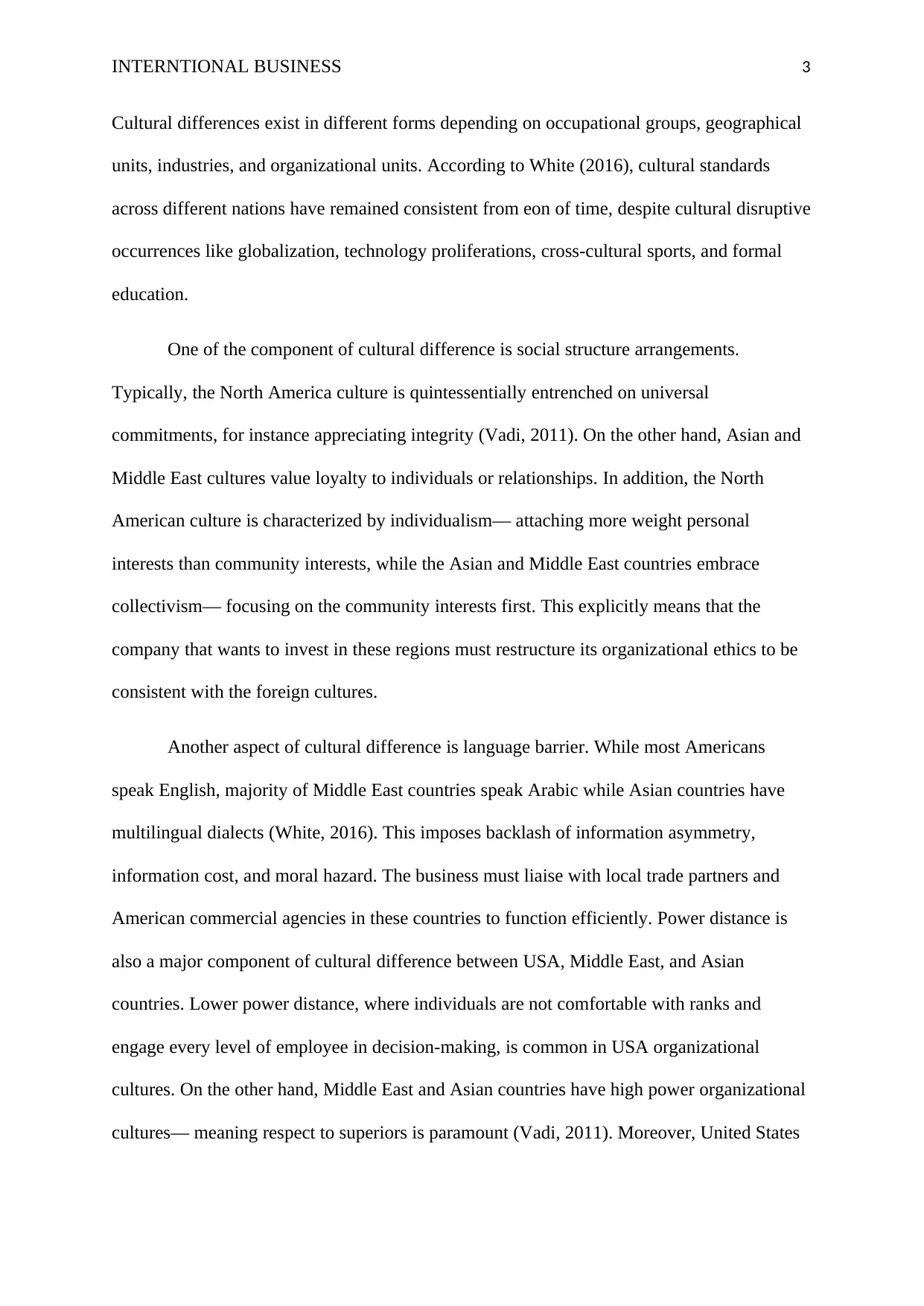
INTERNTIONAL BUSINESS 3
Cultural differences exist in different forms depending on occupational groups, geographical
units, industries, and organizational units. According to White (2016), cultural standards
across different nations have remained consistent from eon of time, despite cultural disruptive
occurrences like globalization, technology proliferations, cross-cultural sports, and formal
education.
One of the component of cultural difference is social structure arrangements.
Typically, the North America culture is quintessentially entrenched on universal
commitments, for instance appreciating integrity (Vadi, 2011). On the other hand, Asian and
Middle East cultures value loyalty to individuals or relationships. In addition, the North
American culture is characterized by individualism— attaching more weight personal
interests than community interests, while the Asian and Middle East countries embrace
collectivism— focusing on the community interests first. This explicitly means that the
company that wants to invest in these regions must restructure its organizational ethics to be
consistent with the foreign cultures.
Another aspect of cultural difference is language barrier. While most Americans
speak English, majority of Middle East countries speak Arabic while Asian countries have
multilingual dialects (White, 2016). This imposes backlash of information asymmetry,
information cost, and moral hazard. The business must liaise with local trade partners and
American commercial agencies in these countries to function efficiently. Power distance is
also a major component of cultural difference between USA, Middle East, and Asian
countries. Lower power distance, where individuals are not comfortable with ranks and
engage every level of employee in decision-making, is common in USA organizational
cultures. On the other hand, Middle East and Asian countries have high power organizational
cultures— meaning respect to superiors is paramount (Vadi, 2011). Moreover, United States
Cultural differences exist in different forms depending on occupational groups, geographical
units, industries, and organizational units. According to White (2016), cultural standards
across different nations have remained consistent from eon of time, despite cultural disruptive
occurrences like globalization, technology proliferations, cross-cultural sports, and formal
education.
One of the component of cultural difference is social structure arrangements.
Typically, the North America culture is quintessentially entrenched on universal
commitments, for instance appreciating integrity (Vadi, 2011). On the other hand, Asian and
Middle East cultures value loyalty to individuals or relationships. In addition, the North
American culture is characterized by individualism— attaching more weight personal
interests than community interests, while the Asian and Middle East countries embrace
collectivism— focusing on the community interests first. This explicitly means that the
company that wants to invest in these regions must restructure its organizational ethics to be
consistent with the foreign cultures.
Another aspect of cultural difference is language barrier. While most Americans
speak English, majority of Middle East countries speak Arabic while Asian countries have
multilingual dialects (White, 2016). This imposes backlash of information asymmetry,
information cost, and moral hazard. The business must liaise with local trade partners and
American commercial agencies in these countries to function efficiently. Power distance is
also a major component of cultural difference between USA, Middle East, and Asian
countries. Lower power distance, where individuals are not comfortable with ranks and
engage every level of employee in decision-making, is common in USA organizational
cultures. On the other hand, Middle East and Asian countries have high power organizational
cultures— meaning respect to superiors is paramount (Vadi, 2011). Moreover, United States
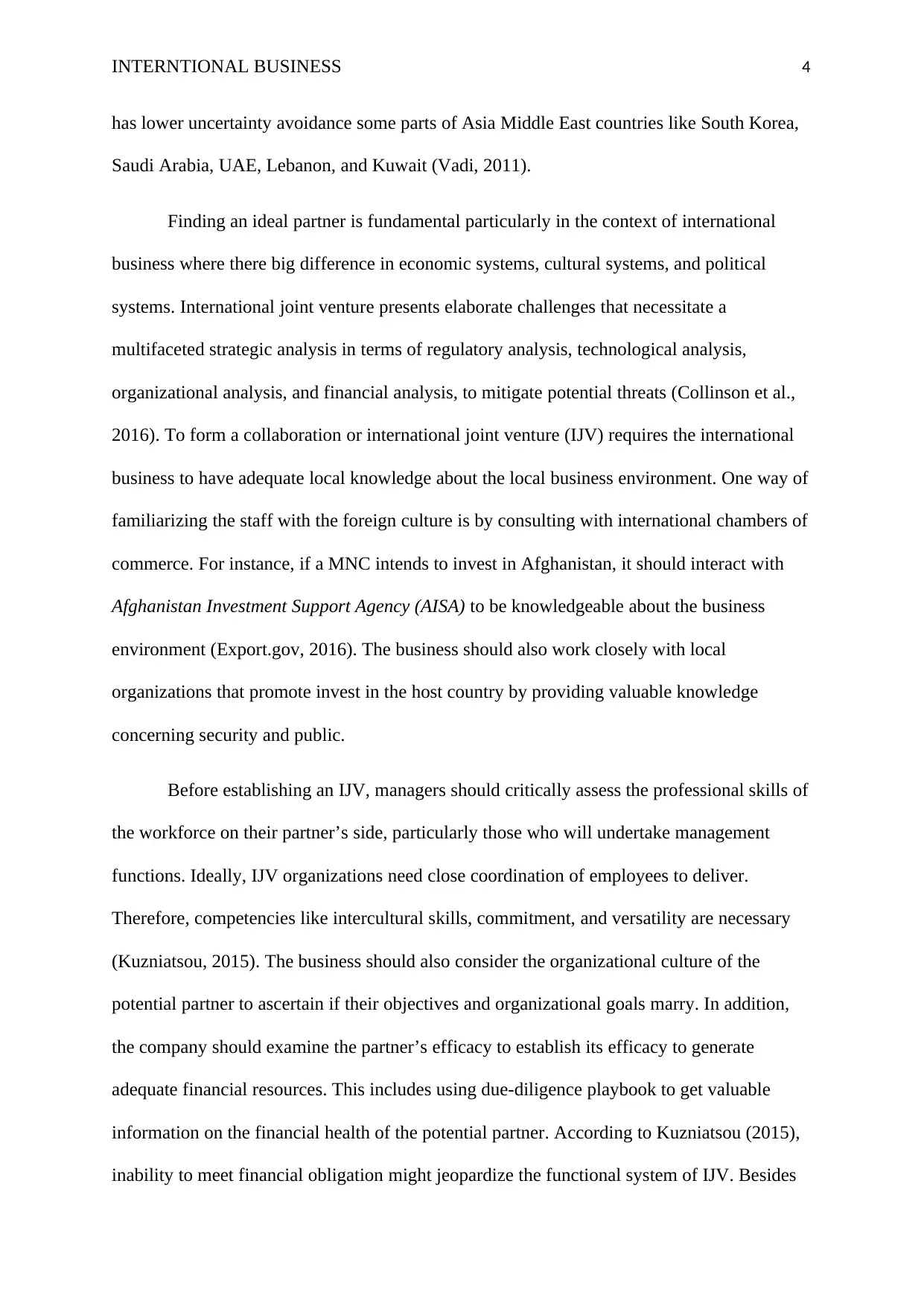
INTERNTIONAL BUSINESS 4
has lower uncertainty avoidance some parts of Asia Middle East countries like South Korea,
Saudi Arabia, UAE, Lebanon, and Kuwait (Vadi, 2011).
Finding an ideal partner is fundamental particularly in the context of international
business where there big difference in economic systems, cultural systems, and political
systems. International joint venture presents elaborate challenges that necessitate a
multifaceted strategic analysis in terms of regulatory analysis, technological analysis,
organizational analysis, and financial analysis, to mitigate potential threats (Collinson et al.,
2016). To form a collaboration or international joint venture (IJV) requires the international
business to have adequate local knowledge about the local business environment. One way of
familiarizing the staff with the foreign culture is by consulting with international chambers of
commerce. For instance, if a MNC intends to invest in Afghanistan, it should interact with
Afghanistan Investment Support Agency (AISA) to be knowledgeable about the business
environment (Export.gov, 2016). The business should also work closely with local
organizations that promote invest in the host country by providing valuable knowledge
concerning security and public.
Before establishing an IJV, managers should critically assess the professional skills of
the workforce on their partner’s side, particularly those who will undertake management
functions. Ideally, IJV organizations need close coordination of employees to deliver.
Therefore, competencies like intercultural skills, commitment, and versatility are necessary
(Kuzniatsou, 2015). The business should also consider the organizational culture of the
potential partner to ascertain if their objectives and organizational goals marry. In addition,
the company should examine the partner’s efficacy to establish its efficacy to generate
adequate financial resources. This includes using due-diligence playbook to get valuable
information on the financial health of the potential partner. According to Kuzniatsou (2015),
inability to meet financial obligation might jeopardize the functional system of IJV. Besides
has lower uncertainty avoidance some parts of Asia Middle East countries like South Korea,
Saudi Arabia, UAE, Lebanon, and Kuwait (Vadi, 2011).
Finding an ideal partner is fundamental particularly in the context of international
business where there big difference in economic systems, cultural systems, and political
systems. International joint venture presents elaborate challenges that necessitate a
multifaceted strategic analysis in terms of regulatory analysis, technological analysis,
organizational analysis, and financial analysis, to mitigate potential threats (Collinson et al.,
2016). To form a collaboration or international joint venture (IJV) requires the international
business to have adequate local knowledge about the local business environment. One way of
familiarizing the staff with the foreign culture is by consulting with international chambers of
commerce. For instance, if a MNC intends to invest in Afghanistan, it should interact with
Afghanistan Investment Support Agency (AISA) to be knowledgeable about the business
environment (Export.gov, 2016). The business should also work closely with local
organizations that promote invest in the host country by providing valuable knowledge
concerning security and public.
Before establishing an IJV, managers should critically assess the professional skills of
the workforce on their partner’s side, particularly those who will undertake management
functions. Ideally, IJV organizations need close coordination of employees to deliver.
Therefore, competencies like intercultural skills, commitment, and versatility are necessary
(Kuzniatsou, 2015). The business should also consider the organizational culture of the
potential partner to ascertain if their objectives and organizational goals marry. In addition,
the company should examine the partner’s efficacy to establish its efficacy to generate
adequate financial resources. This includes using due-diligence playbook to get valuable
information on the financial health of the potential partner. According to Kuzniatsou (2015),
inability to meet financial obligation might jeopardize the functional system of IJV. Besides
Secure Best Marks with AI Grader
Need help grading? Try our AI Grader for instant feedback on your assignments.
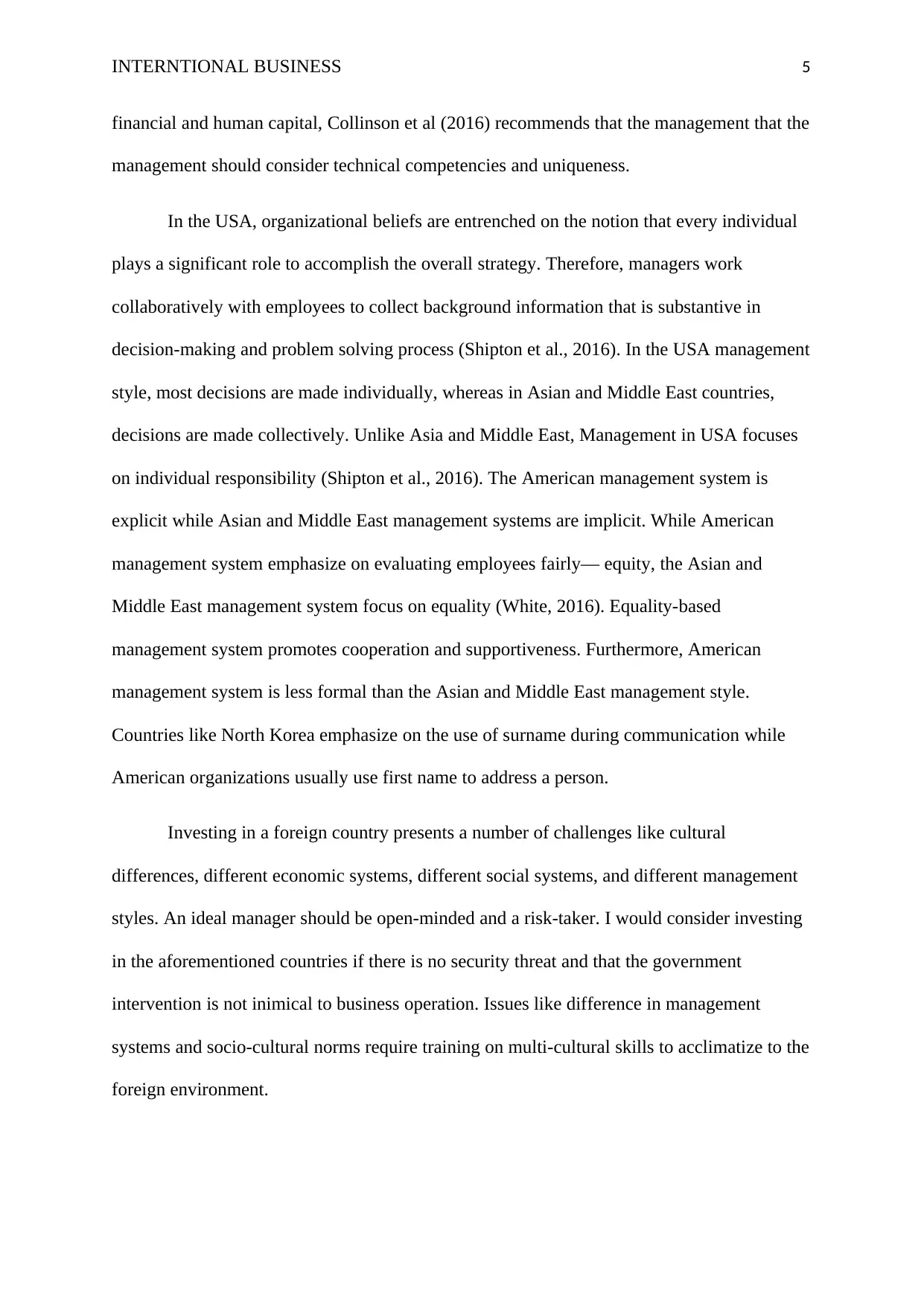
INTERNTIONAL BUSINESS 5
financial and human capital, Collinson et al (2016) recommends that the management that the
management should consider technical competencies and uniqueness.
In the USA, organizational beliefs are entrenched on the notion that every individual
plays a significant role to accomplish the overall strategy. Therefore, managers work
collaboratively with employees to collect background information that is substantive in
decision-making and problem solving process (Shipton et al., 2016). In the USA management
style, most decisions are made individually, whereas in Asian and Middle East countries,
decisions are made collectively. Unlike Asia and Middle East, Management in USA focuses
on individual responsibility (Shipton et al., 2016). The American management system is
explicit while Asian and Middle East management systems are implicit. While American
management system emphasize on evaluating employees fairly— equity, the Asian and
Middle East management system focus on equality (White, 2016). Equality-based
management system promotes cooperation and supportiveness. Furthermore, American
management system is less formal than the Asian and Middle East management style.
Countries like North Korea emphasize on the use of surname during communication while
American organizations usually use first name to address a person.
Investing in a foreign country presents a number of challenges like cultural
differences, different economic systems, different social systems, and different management
styles. An ideal manager should be open-minded and a risk-taker. I would consider investing
in the aforementioned countries if there is no security threat and that the government
intervention is not inimical to business operation. Issues like difference in management
systems and socio-cultural norms require training on multi-cultural skills to acclimatize to the
foreign environment.
financial and human capital, Collinson et al (2016) recommends that the management that the
management should consider technical competencies and uniqueness.
In the USA, organizational beliefs are entrenched on the notion that every individual
plays a significant role to accomplish the overall strategy. Therefore, managers work
collaboratively with employees to collect background information that is substantive in
decision-making and problem solving process (Shipton et al., 2016). In the USA management
style, most decisions are made individually, whereas in Asian and Middle East countries,
decisions are made collectively. Unlike Asia and Middle East, Management in USA focuses
on individual responsibility (Shipton et al., 2016). The American management system is
explicit while Asian and Middle East management systems are implicit. While American
management system emphasize on evaluating employees fairly— equity, the Asian and
Middle East management system focus on equality (White, 2016). Equality-based
management system promotes cooperation and supportiveness. Furthermore, American
management system is less formal than the Asian and Middle East management style.
Countries like North Korea emphasize on the use of surname during communication while
American organizations usually use first name to address a person.
Investing in a foreign country presents a number of challenges like cultural
differences, different economic systems, different social systems, and different management
styles. An ideal manager should be open-minded and a risk-taker. I would consider investing
in the aforementioned countries if there is no security threat and that the government
intervention is not inimical to business operation. Issues like difference in management
systems and socio-cultural norms require training on multi-cultural skills to acclimatize to the
foreign environment.
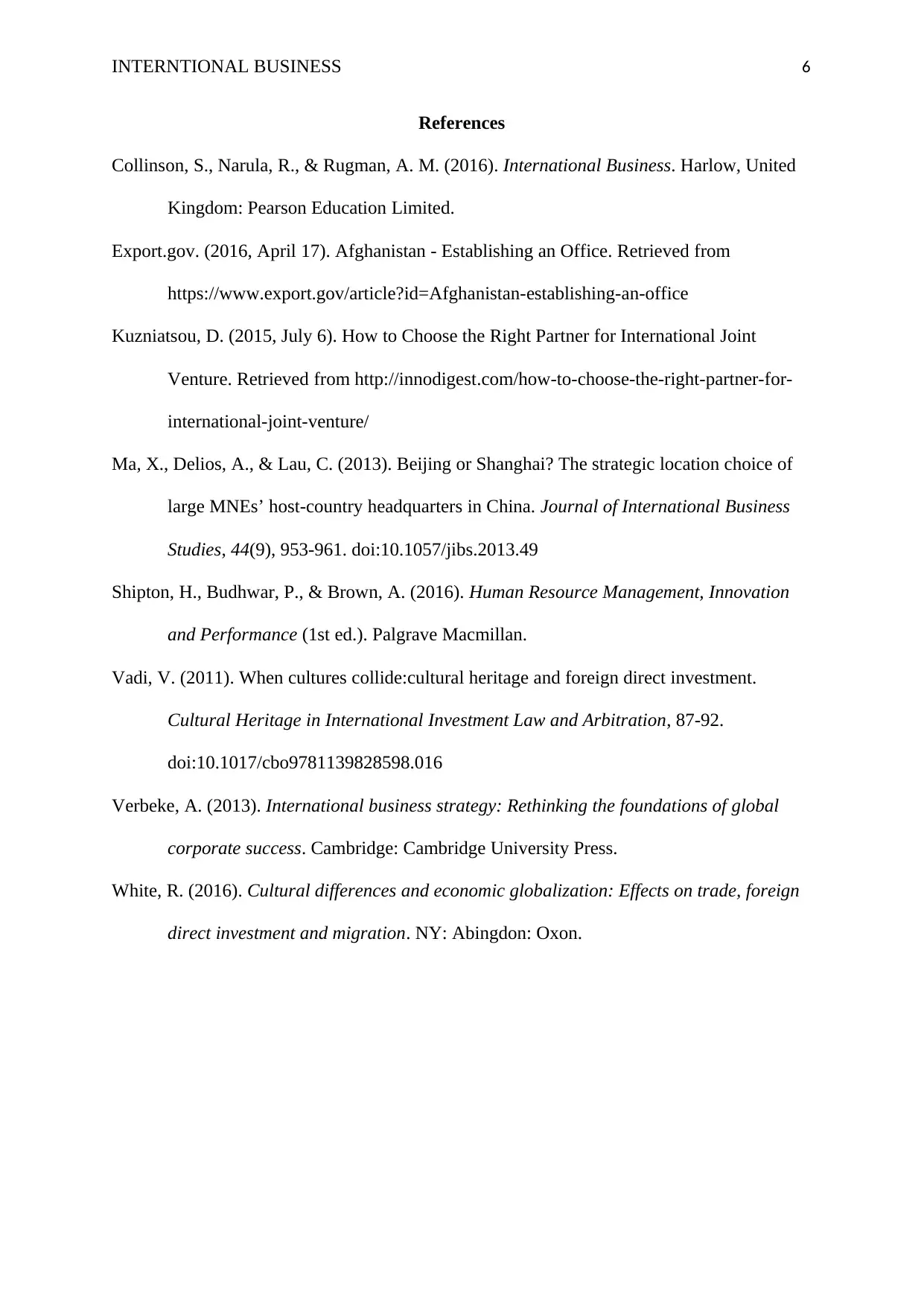
INTERNTIONAL BUSINESS 6
References
Collinson, S., Narula, R., & Rugman, A. M. (2016). International Business. Harlow, United
Kingdom: Pearson Education Limited.
Export.gov. (2016, April 17). Afghanistan - Establishing an Office. Retrieved from
https://www.export.gov/article?id=Afghanistan-establishing-an-office
Kuzniatsou, D. (2015, July 6). How to Choose the Right Partner for International Joint
Venture. Retrieved from http://innodigest.com/how-to-choose-the-right-partner-for-
international-joint-venture/
Ma, X., Delios, A., & Lau, C. (2013). Beijing or Shanghai? The strategic location choice of
large MNEs’ host-country headquarters in China. Journal of International Business
Studies, 44(9), 953-961. doi:10.1057/jibs.2013.49
Shipton, H., Budhwar, P., & Brown, A. (2016). Human Resource Management, Innovation
and Performance (1st ed.). Palgrave Macmillan.
Vadi, V. (2011). When cultures collide:cultural heritage and foreign direct investment.
Cultural Heritage in International Investment Law and Arbitration, 87-92.
doi:10.1017/cbo9781139828598.016
Verbeke, A. (2013). International business strategy: Rethinking the foundations of global
corporate success. Cambridge: Cambridge University Press.
White, R. (2016). Cultural differences and economic globalization: Effects on trade, foreign
direct investment and migration. NY: Abingdon: Oxon.
References
Collinson, S., Narula, R., & Rugman, A. M. (2016). International Business. Harlow, United
Kingdom: Pearson Education Limited.
Export.gov. (2016, April 17). Afghanistan - Establishing an Office. Retrieved from
https://www.export.gov/article?id=Afghanistan-establishing-an-office
Kuzniatsou, D. (2015, July 6). How to Choose the Right Partner for International Joint
Venture. Retrieved from http://innodigest.com/how-to-choose-the-right-partner-for-
international-joint-venture/
Ma, X., Delios, A., & Lau, C. (2013). Beijing or Shanghai? The strategic location choice of
large MNEs’ host-country headquarters in China. Journal of International Business
Studies, 44(9), 953-961. doi:10.1057/jibs.2013.49
Shipton, H., Budhwar, P., & Brown, A. (2016). Human Resource Management, Innovation
and Performance (1st ed.). Palgrave Macmillan.
Vadi, V. (2011). When cultures collide:cultural heritage and foreign direct investment.
Cultural Heritage in International Investment Law and Arbitration, 87-92.
doi:10.1017/cbo9781139828598.016
Verbeke, A. (2013). International business strategy: Rethinking the foundations of global
corporate success. Cambridge: Cambridge University Press.
White, R. (2016). Cultural differences and economic globalization: Effects on trade, foreign
direct investment and migration. NY: Abingdon: Oxon.
1 out of 6
Related Documents
Your All-in-One AI-Powered Toolkit for Academic Success.
+13062052269
info@desklib.com
Available 24*7 on WhatsApp / Email
![[object Object]](/_next/static/media/star-bottom.7253800d.svg)
Unlock your academic potential
© 2024 | Zucol Services PVT LTD | All rights reserved.





